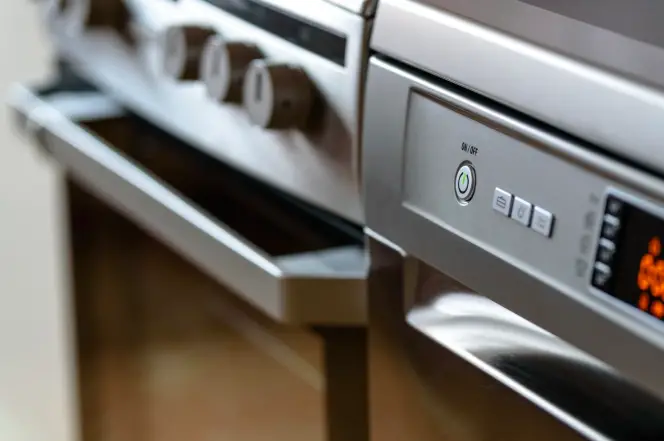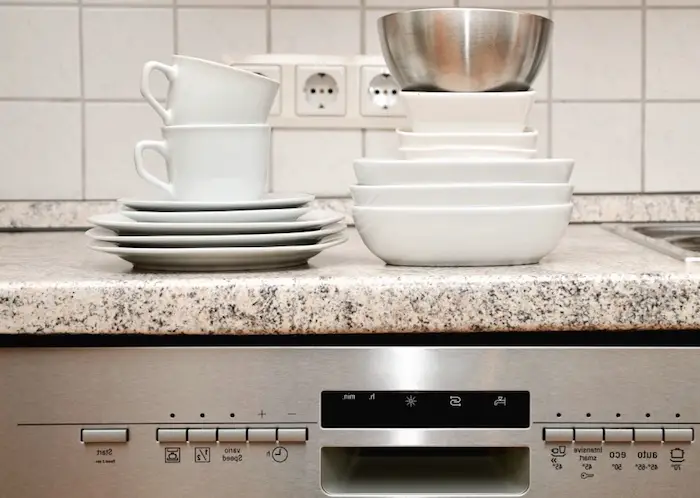A dishwasher is one of the most helpful appliances you can have at home especially if you are a busy person. This appliance will make it easier for you to wash your dishes quickly, thereby giving you the luxury of relaxing without worrying about washing up your utensils after every meal.
Today, we will share tips on how to use your dishwasher optimally at all times.
1. Avoid packing your utensils too tightly
In a bid to save energy, it is tempting to squeeze one more cup or plate into the dishwasher racks. However, try to resist that temptation because overloading your dishwasher will prevent it from running efficiently and you may be forced to re-wash several dishes that didn’t clean well.
It is true that a fully-loaded dishwasher is more energy efficient, but you need to ensure that it is full, and not overloaded. It is better to run two loads than to get everything in there and end up not getting great results.
2. Sort your dishes
It’s good to separate overly dirty dishes from those that are not too dirty. For dishes that are not too dirty, you can have them cleaned on a lighter cycle. This will help save energy and cut down your energy bills. However, if you mix your overly dirty dishes with those that aren’t too dirty and run a shorter, lighter cycle, the chances are that a few really dirty utensils in the mix will come out not cleaned well.
Therefore, group your dirtiest utensils together and run an extended cycle, or simply hand-wash them.
3. Keep dishwashers’ door seals clean
After a couple of cycles, you will notice that there is a buildup of gunk around your appliance door and on the soap drawer too.
If left to build up for a long time, your dishwasher can start smelling unpleasant. Besides, the buildup affects the power of the door seal and can serve as a breeding ground for molds. Therefore, regularly wipe your appliance door seals with a mild detergent and damp cloth to avoid any buildup.
4. Clean out the dishwasher trap
Although not a pleasant task, cleaning your dishwasher trap will help you get the most out of your appliance. On the bottom side of your unit, there is a small tray where all the heavy food scrapped from your utensils that were not washed away to the drainage accumulate. Although a dirty job, cleaning the tray regularly will help your unit run smoothly. Also, scraping the dishwasher trap will help prevent your appliance from getting stained.
5. Run hot water first
To clean your dishes effectively, your dishwasher needs hot water. Make sure to turn on hot water tap first and allow hot water to run for a few minutes before switching on your dishwasher. By doing this, the dishwasher will not wait for the cold water to filter out and this will shorten the time it takes to clean your dishes.
6. Know where the sprayer is
It is important to know where your dishwasher’s sprayer is so you can angle your soiled dishes towards it. This will help avoid the need to run a second load or hand wash.
However, avoid placing bulky items in the trail of the sprayer as they may block other dishes from being thoroughly rinsed.
7. Stagger the cutleries
For cleaner cutleries, stagger all the sharp utensils the knives and forks drawer so that some have their knobs down and others have their knobs up.
This will give more room for the soap and water to move around for a thorough clean.
8. Use soap in moderation
It is always tempting to keep adding soap in an attempt to have cleaner dishes. However, it doesn’t work like that. In fact, too much soap will clog your dishwasher and prevent it from running optimally.
Use soap as recommended on its packaging and only use soaps that are recommended for dishwashing. If your detergent has added wash aid, don’t add any extra soap.
Also, you can check your dishwasher manual for the correct dosage of liquid or powder detergent. This ensures that you use the right amount of soap for different cycles, for great results.
9. Use vinegar

After every few months, it is important to give your dishwasher a thorough cleaning using vinegar. To do this, first, make sure your appliance is empty before spraying white vinegar into its base. Close its door and run a shorter cycle.
Vinegar helps to remove food particles and makes your dishwasher smell fresh.
10. Clean dishwasher’s filter
Over time, your dishwasher’s filter, which is meant to prevent large food particles from going to the dishwasher drain, can accumulate a buildup of food particles. If not cleaned, large food particles can find their way to your dishwasher drainage and might cause a blockage.
11. Choose the correct options and programs
Dishwashers have a variety of options and programs that suit different washing needs. Depending on how dirty or soiled your dishes are, you can configure your dishwasher to run on a shorter cycle or longer cycle for a perfect clean. Always check your dishwasher user manual for a better understanding of the wash cycle.
12. Freshen up your dishwasher
Clip a dishwasher freshener on the upper basket and run your dishwasher to remove any foul smell. Dishwasher fresheners make your dishes and dishwasher smell clean and fresh.
13. Heat things up
One advantage dishwasher has over manual washing is the ability to shoot jets of extremely hot water to clean your utensils hygienically. Water temperatures inside a dishwasher can escalate really quickly to kill bacteria and germs effectively.
14. Treat water getting into your dishwasher
Hard water is richer in minerals than soft water. This causes it to not only leave white residue on your appliance but results in mineral deposits on the inside of your dishwasher. This can result in rusting of internal surfaces of your dishwasher. Therefore, it is wise not to run hard water in your appliance.
If this is not possible, you can use dishwasher salt to soften hard water. When the salt indicator lights up, refill the dispenser compartment.
Bottom Line
A dishwasher is a valuable appliance to have at home. We hope the above 14 tips will help you get the best out of your dishwasher.








